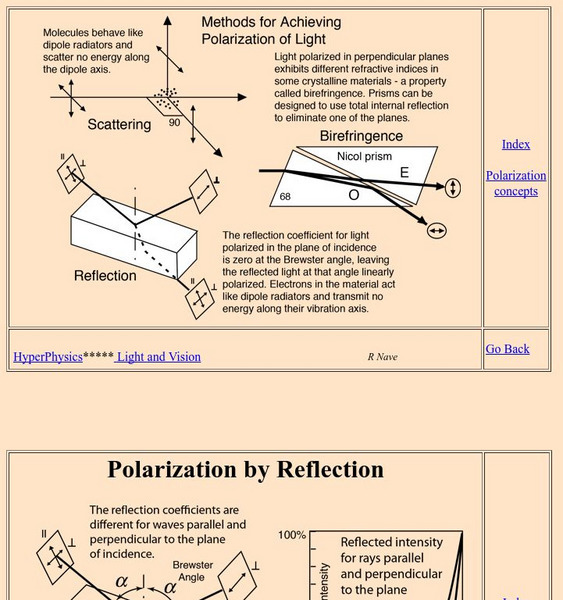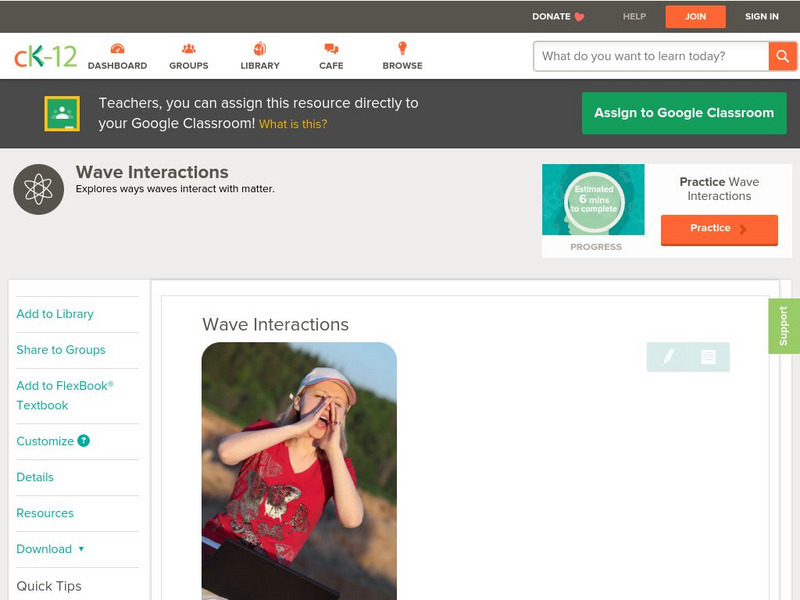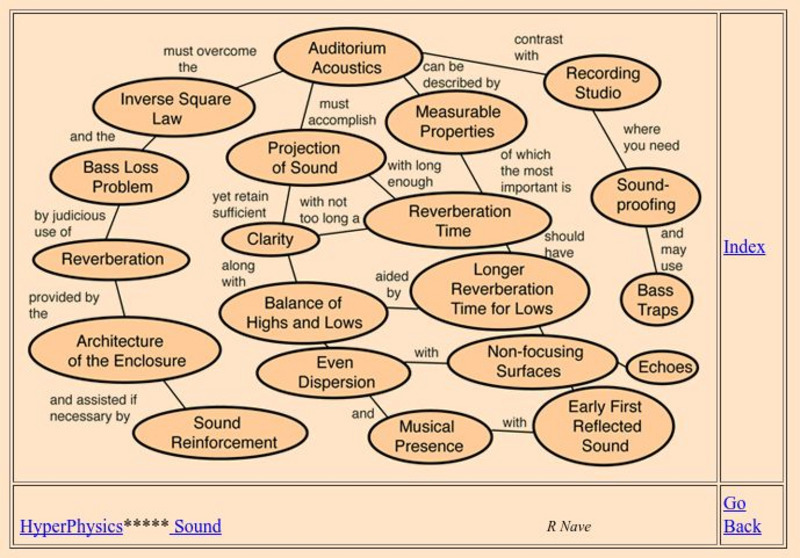Georgia State University
Georgia State University: Hyper Physics: Methods of Polarization
At this college physics department site, the polarization of light is explained and illustrated as well as the primary methods of polarization (scattering, reflection, and refraction).
Georgia State University
Georgia State University: Hyper Physics: Crossed Polarizers
At this univeristy physics department site, the polarization of light is explained and illustrated. Methods for analyzing light to determine the degree of polarization are stated and explained with equations.
CK-12 Foundation
Ck 12: Physical Science: Wave Interactions
[Free Registration/Login may be required to access all resource tools.] Ways that waves can interact with matter and examples.
American Association of Physics Teachers
Com Padre Digital Library: Open Source Physics: Spinning Hoop Model
A model of a bead traveling along a spinning hoop. The hoop's velocity and the bead's initial angle can be modified, and the results are displayed on an accompanying chart.
Georgia State University
Georgia State University: Hyper Physics: Auditorium Acoustics
Home page for a hypertext physics course on auditorium acoustics and acoustical design.
Georgia State University
Georgia State University: Hyper Physics: Diffraction
This physics department site provides links about the diffraction of light. Each page includes thorough explanations and meaningful graphics. Some pages include interactive problem-solving practice sections.
Georgia State University
Georgia State University: Hyper Physics: Scattering Concepts
A collection of several pages explaining the principles which underlie Rayleigh scattering of light.
Texas Education Agency
Texas Gateway: Physics of Hearing: Sound Intensity and Sound Level
By the end of this section, you will be able to define intensity, sound intensity, and sound pressure level and to calculate sound intensity levels in decibels (dB).
Physics Classroom
The Physics Classroom: Waves: Behavior of Waves: Interference of Waves
Students discover wave interference, the phenomenon that occurs when two waves meet while traveling along the same medium.
Physics Classroom
The Physics Classroom: Physics Tutorial: Waves: The Speed of a Wave
With sample data, equations, and practice problems, students explore the concept of wave speed.
CK-12 Foundation
Ck 12: Physical Science: Surface Wave
[Free Registration/Login may be required to access all resource tools.] Definition and example of a surface wave, how the medium moves in a surface wave and why ocean waves break.
Physics Classroom
The Physics Classroom: Waves: The Anatomy of a Wave
Students explore the characteristics of both transverse and longitudinal waves.
Physics Classroom
The Physics Classroom: Waves: Harmonics and Patterns
This illustrated physics tutorial helps students understand harmonics and wave patterns.
Physics Classroom
The Physics Classroom: Sound Waves and Music: The Doppler Effect and Shock Waves
This physics tutorial focuses on the application of the Doppler effect to sound.
Physics Aviary
Physics Aviary: Wavelength Lab
This lab is designed to have students investigate the relationship between the speed of a wave, the frequency of the wave and the wavelength of the wave. Students can vary wave speed and frequency. Each of these should be varied while...
CK-12 Foundation
Ck 12: Physical Science: Longitudinal Wave
[Free Registration/Login may be required to access all resource tools.] What a longitudinal wave is, its compressions and rarefactions and what a P wave is.
Physics Classroom
The Physics Classroom: Waves: Formation of Standing Waves
Through illustrated examples and animations, students investigate the formation of standing waves.
Physics Classroom
The Physics Classroom: Sound Waves and Music: Standing Wave Patterns
Elaborate on the essential characteristics and the causes of standing wave patterns and relate these patterns to the vibrations of musical instruments.
Physics Aviary
Physics Aviary: Practice Problems: Wave Properties From Graph 1
Determine the wavelength and amplitude of a wave based on the vertical position vs. horizontal position graph.
Physics Aviary
Physics Aviary: Practice Problems: Wave Properties From Graph 2
Determine the period, frequency and amplitude of the wave that produced the position vs. time graph shown below.
Physics Aviary
Physics Aviary: Visualizing a Wave as a Line of Oscillating Objects
This program gives students a visual representation of a wave as a line of masses that are oscillating out of step. Each oscillating mass will affect the oscillation of the wave next to it.
Physics Classroom
The Physics Classroom: Waves: The Doppler Effect
This explanation of the Doppler effect allows students to visualize how this physics phenomenon happens.
Physics Aviary
Physics Aviary: Wave on String Lab
This lab is designed to help students discover the connections between the linear density of a string and the tension in the string with the speed of the wave along the string. The program can be set with six identical strings or six...
Physics Aviary
Physics Aviary: Resonance Tube Lab
This lab is designed to help students visualize the formation of standing waves in a wind instrument. Students will be able to view fundamental waves as well as some higher harmonics. They can work with a tube with two open ends or just...
Other popular searches
- Waves Physics
- Waves Physics Tsunami
- Sound Waves Physics
- Energy Waves Physics
- Waves Physics High School
- Waves Physics Radio Waves
- Inquiry Based Physics Waves
- Waves Physics Practical
- Latitudinal Waves Physics
- Waves Physics Pictures
- Waves Physics Worksheets
- Waves Physics Gallery












